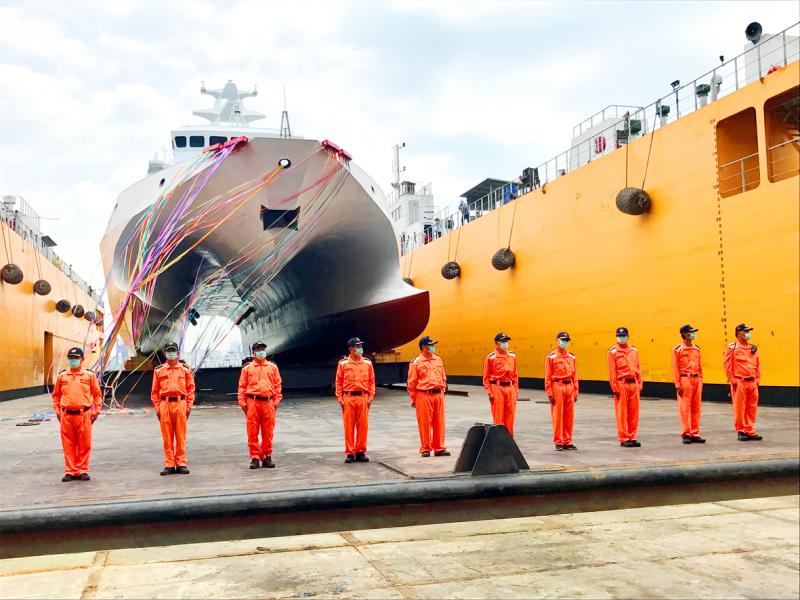The Coast Guard Administration (CGA) yesterday unveiled its first domestically built 600-tonne patrol vessel at a ceremony in Kaohsiung.
Construction of the ship, based on the design for the navy’s Tuo Chiang-class corvettes, began in January last year. Work on a second patrol vessel began later in the same year.
Vice Premier Chen Chi-mai (陳其邁) attended the launch for the new vessel — the Anping (安平) — at the docks of Jong Shyn Shipbuilding Corp, which was commissioned to build it.

Photo: Hung Chen-hung, Taipei Times
Yesterday’s ceremony also marked the start of work on a third 600-tonne patrol vessel, as well as a third 35-tonne vessel for the CGA.
Similar to the Tuo Chiang-class ships, the Anping has a large deck and retains the launchers for Hsiung Feng II and III missiles, CGA fleet branch head Ching-chin (謝慶欽) said.
However, it differs from the Tuo Chiang in its added facilities and equipment for rescue operations, he said.
The vessel is capable of speeds of up to 40 knots, and would greatly increase the agency’s rescue and operations capabilities in the open seas, he said.
The CGA’s long-term plans call for a total of 141 new vessels of different classes, and the Anping is to be delivered in October — two months ahead of schedule, he said.
The government has budgeted NT$4.26 billion (US$141.9 million) for domestic shipbuilding, and hopes it can spur the shipbuilding industry while meeting the nation’s defense needs, Chen said.
Building 600-tonne CGA ships with missile launchers means that the nation’s defense capacity can be quickly boosted in the event of a war, he said.
Domestic shipbuilding would also create 8,000 job opportunities and NT$100 billion in manufacturing output, he said.

MAKING WAVES: China’s maritime militia could become a nontraditional threat in war, clogging up shipping lanes to prevent US or Japanese intervention, a report said About 1,900 Chinese ships flying flags of convenience and fishing vessels that participated in China’s military exercises around Taiwan last month and in January last year have been listed for monitoring, Coast Guard Administration (CGA) Deputy Director-General Hsieh Ching-chin (謝慶欽) said yesterday. Following amendments to the Commercial Port Act (商港法) and the Law of Ships (船舶法) last month, the CGA can designate possible berthing areas or deny ports of call for vessels suspected of loitering around areas where undersea cables can be accessed, Oceans Affairs Council Minister Kuan Bi-ling (管碧玲) said. The list of suspected ships, originally 300, had risen to about

DAREDEVIL: Honnold said it had always been a dream of his to climb Taipei 101, while a Netflix producer said the skyscraper was ‘a real icon of this country’ US climber Alex Honnold yesterday took on Taiwan’s tallest building, becoming the first person to scale Taipei 101 without a rope, harness or safety net. Hundreds of spectators gathered at the base of the 101-story skyscraper to watch Honnold, 40, embark on his daredevil feat, which was also broadcast live on Netflix. Dressed in a red T-shirt and yellow custom-made climbing shoes, Honnold swiftly moved up the southeast face of the glass and steel building. At one point, he stepped onto a platform midway up to wave down at fans and onlookers who were taking photos. People watching from inside

Japan’s strategic alliance with the US would collapse if Tokyo were to turn away from a conflict in Taiwan, Japanese Prime Minister Sanae Takaichi said yesterday, but distanced herself from previous comments that suggested a possible military response in such an event. Takaichi expressed her latest views on a nationally broadcast TV program late on Monday, where an opposition party leader criticized her for igniting tensions with China with the earlier remarks. Ties between Japan and China have sunk to the worst level in years after Takaichi said in November that a hypothetical Chinese attack on Taiwan could bring about a Japanese

STREAMLINED: The dedicated funding would allow the US to transfer equipment to Taiwan when needed and order upgraded replacements for stockpiles, a source said The US House of Representatives on Thursday passed a defense appropriations bill totaling US$838.7 billion, of which US$1 billion is to be allocated to reinforcing security cooperation with Taiwan and US$150 million to replace defense articles provided to the nation. These are part of the Consolidated Appropriation Act, which the US House yesterday passed with 341 votes in favor and 88 against. The act must be passed by the US Senate before Friday next week to avoid another government shutdown. The US House Committee on Appropriations on Monday unveiled the act, saying that it allocates US$1 billion for the Taiwan Security Cooperation Initiative